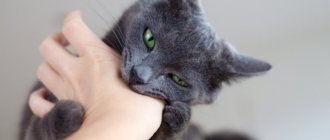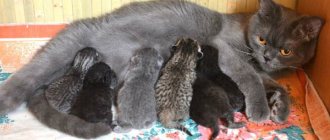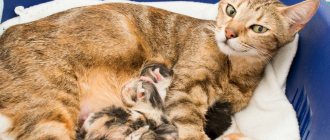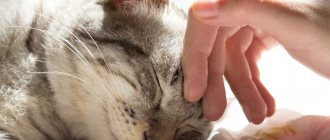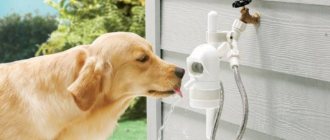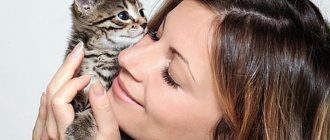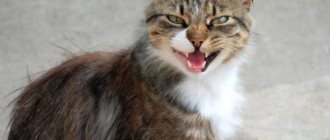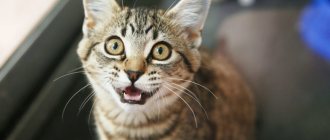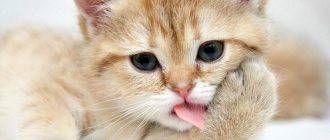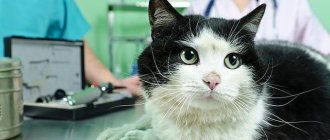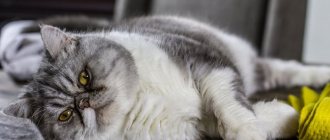Causes
Sneezing is a reflex process. With its help, the animal’s body gets rid of various irritants that have entered the nasal passages. If dust, dirt, hairs, or fluff gets into a kitten's nose, he will sneeze, trying to get rid of them. These are physiological causes that do not require treatment.
It’s another matter when sneezing is provoked by external and internal causes that negatively affect the health of the animal. These may be the following conditions and diseases:
- Allergic reaction. Cats can also suffer from the negative effects of poor ecology, react to strong odors, such as perfumes and aerosols, suffer from dust mites and other types of allergies. A sneezing attack can be triggered by cigarette smoke, plant pollen, odors of household chemicals, mold, cosmetics, air fresheners, even common kitchen seasonings.
- Bronchial asthma. Most often it appears as a complication after a severe allergy.
- Respiratory diseases caused by various infections. Typically, such diseases are accompanied by various additional symptoms that make it possible to distinguish them from other manifestations.
Why do cats sneeze?
Representatives of the cat family have a sensitive sense of smell, which is why purring noses keenly perceive pungent odors. Therefore, sneezing among inquisitive cat owners is not uncommon.
Cats often sneeze when they inhale strong odors.
A mustache can crawl under a chest of drawers or sniff a bottle of perfume, and a sneeze will immediately appear. In addition, cats cannot stand the smell of tobacco and the aromas of household chemicals - air fresheners, powders. All these cases relate to the effects of local irritants on the nasal mucous membranes and stop when the cause is eliminated.
In addition to the physiological reaction, there are more serious reasons for the appearance of sneezes in a cat:
- colds - also accompanied by mucus discharge from the nose, excessive warming of the paws and ears, cough, constant desire to sleep, refusal to eat and an increase in body temperature above 38 degrees (measured through the anus with a special thermometer);
- inflammation of the mucous membranes in the throat (laryngitis) - recognized along with constant sneezing by wheezing in the larynx and difficulty breathing, coughing with vomiting and general weakness of the pet;
- allergic or infectious rhinitis - in the first case, the mucous discharge is liquid and transparent, in the second it has a thick greenish consistency and a specific smell, in both cases the nose turns red and the eyes water;
- sinusitis - similar to rhinitis, difficult to diagnose independently, manifested in the animal’s behavior by rubbing the nose with its paws and careful movements of the head, general slowness;
- carious infection - due to the development of pathogenic microflora in the oral cavity, the nearby nasal passages become inflamed, sneezing, runny nose and watery eyes appear (a veterinarian can determine this cause, since the symptoms are similar to a cold);
- pulmonary helminths - cause not only sneezing in cats, but also a runny nose with cough and fever;
- asthma - characterized by repeated sneezing against a background of shortness of breath and asthma attacks;
- Oncological disease of the nasal mucous membranes is a rarity among cats, it can only be determined by a specialist, and can indirectly be confirmed by a strong odor from the mouth and loss of appetite (along with sneezing and a runny nose, especially with blood).
Colds in cats manifest themselves in the same way as in humans.
The most dangerous, and in advanced cases, fatal for cats, are infections such as calcivirosis, mycoplasmosis and panleukopenia. An urgent visit to the veterinarian if your cat has a runny nose or frequent sneezing will help preserve not only the health, but also the life of your pet.
Important! Laryngitis can be a concomitant symptom of tuberculosis and rhinotracheitis, so if you feel unwell, you should immediately contact a veterinarian for a correct diagnosis.
Coughing in cats may be a symptom of asthma
In addition, repeated sneezing may begin due to a foreign object entering the nasal openings. If the foreign body is small in size, then under the influence of a sharp exhalation it will independently be removed from the cat’s nose. But large objects tightly stuck in soft tissues will have to be removed at a veterinary clinic. You cannot perform such an operation on your own, otherwise harm to the pet’s health will inevitably occur.
Thus, if a cat’s sneezing occurs only once and is not accompanied by other symptoms of the disease, there is no need to worry about the animal’s condition. Otherwise, you should quickly go to see a cat doctor for a diagnosis and appropriate treatment.
Video: colds in animals
Associated symptoms
When sneezing, a kitten may suffer from a runny nose, inflammation of the eyes, and discharge from them, including purulent discharge. A kitten who is sick with an infectious disease or has a severe cold or hypothermia will not only sneeze. He will have difficulty breathing, runny nose, tears, shortness of breath.
As the temperature rises, the animal refuses to eat, becomes lethargic, and tries to hide from people. He may develop vomiting, and if the bronchi and lungs are affected, characteristic gurgling and wheezing breathing occurs.
This condition threatens the pet's life.
A kitten sneezes often: when should you see a doctor?
The reason to see a doctor is a combination of a runny nose and conjunctivitis. When the disease is limited to these symptoms, the doctor prescribes treatment for allergies.
The health and life of the kitten are threatened by the following pathological signs:
- depressed state;
- loss of appetite;
- diarrhea and vomiting;
- rise or fall in body temperature;
- cough;
- dyspnea;
- stomatitis;
- gingivitis;
- lameness.
Treatment method and prognosis
Treatment is always related to the cause of the disease. If this is due to the animal’s environment, you need to remove the source of the allergy or irritation: remove poisonous or flowering plants, stop using caustic household chemicals, carry out a thorough cleaning and do not smoke, do not use aerosols or perfumes in the room where the kitten is.
Diseases should be treated only after consultation with a veterinarian, since only a specialist can determine the diagnosis, select medications and doses for a small kitten.
If you act on your own, you can seriously harm your pet.
Allergic irritants
It is strongly recommended to remember what caused your pet’s sneezing the last time. Was air freshener sprayed near the cat's potty? Or did one of the family members smoke on the balcony without completely closing the door? If the owner answers yes to one of the questions, the visit to the veterinarian is cancelled.
This is the list of irritants that cause the sneeze reflex in animals:
- Colognes and perfumes. People love the way they smell, cats are not at all happy.
- If mold is found in the apartment, know that it is to blame for the kitten’s condition.
- Sometimes kittens react strongly to pollen. The reaction is accompanied by tearing and sneezing.
- Air fresheners, as described above.
- Detergents and cleaning products.
- Tobacco smoke.
What to do if the kitten starts sneezing? Make sure that the listed irritants are absent, paying attention to the presence of mucous discharge from the animal’s nose. If clear mucus is present, contact your veterinarian.
What to do at home
There cannot be a definite and simple answer here; it is necessary to strictly follow all the doctor’s recommendations and not self-medicate.
A sick kitten should be kept warm and well fed. Since it may be difficult for him to eat due to a stuffy nose, it is best to give him soft, high-calorie, but easily digestible food. You need to make sure that he always has access to clean water and under no circumstances give him cold foods, including drinking.
Treating a kitten for a virus
This subsection is for informational purposes only; all manipulations are carried out only after an accurate diagnosis has been established. Medicines are prescribed by a veterinarian, who also explains how to use them.
Has your kitten caught a viral infection? The specialist will prescribe antibiotics and anti-inflammatory drugs. Among the first, the most common are “Maxidin” and “Fosprenil”, which kill viruses in the baby’s body. “Baksin” and “Gamavit” are responsible for restoring a pet after an illness.
Sneezing with bloody discharge
If an animal sneezes with blood, it means that the nasal mucosa is damaged.
There are several reasons why this happens:
- ingress of traumatic foreign bodies or their prolonged presence in the nose;
- a sharp change in temperature after returning from the street;
- inflammatory process;
- muzzle injuries;
- exposure to irritants, especially aerosols.
Air fresheners, cigarette smoke, and various cosmetic sprays are very harmful to all cats. To protect the health of your pet, you need to choose high-quality household chemicals. When spraying aerosols, make sure that they do not get on the animal’s face. It is extremely undesirable for owners to smoke in the apartment; to do this, they need to go out onto the balcony or onto the street.
A single sneeze, even with blood, is a relatively safe symptom. Owners should be wary if a cat sneezes several times in a row or has bleeding from its nose. You can stop nosebleeds with a cold compress (a handkerchief soaked in cold tap water). There is no need to apply ice. Forcing a cat to raise its face is dangerous. If the compress does not help within 5-10 minutes, you need to go to a veterinary clinic.
What to do if your cat sneezes?
If your cat is sneezing and her eyes are festering, there is no need to self-treat, but immediately seek advice from a veterinarian.
First of all, the specialist collects anamnesis - the animal’s age, weight, temperature, changes in diet. It is advisable to indicate the dates of treatment for worms and fleas, and the timing of vaccinations.
To make an accurate diagnosis, tests and examinations will be required. The standard kit includes a blood test (general and biochemical), cytology and bacterial culture. All this will allow us to determine the cause of the condition.
Sometimes medications are not needed, ordinary manipulations are enough. For example, a pet may sneeze due to a foreign body in the nasal passage. The cause is easy to detect during inspection. If it is a small bead, midge or other tiny object, then the specialist will remove it immediately. In the case of tumors of any origin, a more thorough examination is required.
Removal of the tumor occurs using anesthesia. The resulting material must be sent for histology. It will determine the nature of the tumor.
Prevention of colds, infectious and viral diseases in kittens
Prevention of viral diseases is considered an essential aspect of kitten care. It is important to understand that even the highest quality vaccines do not guarantee that the kitten will not get sick. However, statistics show that vaccinated animals infected with a viral infection tolerate the disease much easier.
Note! According to generally accepted recommendations, the kitten should be kept in quarantine until it receives basic vaccination.
The mother’s immunity protects the baby only until the age of three months, after which the kitten’s body will have to fight pathogens on its own. Prevention of colds and bacterial diseases includes high-quality care and comprehensive protection of the pet from contact with sources of infection. The source of infection can be stray animals, places where garbage accumulates, wild rodents, etc.
Infection
The main symptom of an infection of the upper respiratory tract (not only in humans, but also in cats) is sneezing. This is how the animal’s body gives signals that it is infected with bacteria or viruses, which provokes sneezing. The latter can be combined with fever, various discharges from the nasal passages, sour eyes, unpleasant cough, difficulty breathing, and enlarged glands.
The most correct reaction of a cat owner is to contact an animal clinic. The veterinarian is able to accurately identify the causative agent of the infection (based on the results of the tests) and recommend competent treatment according to the weight and age of the animal.
Selecting and giving medications to a cat on your own (a careless owner can treat the animal with medications for humans) is strictly prohibited!
Asthma in four-legged animals
Asthma is a disease that occurs not only in humans. Veterinarians and pet owners are increasingly encountering this disease. Asthma in a chronic state against the background of provocateurs (tobacco smoke, pollen from flowering plants, fluff, dust, chemical sprays and even the banal smell of the housewife or owner’s perfume) can cause an attack accompanied by sneezing and coughing, when the animal finds it difficult to breathe normally.
The first aid in such a situation will be the following: take the cat and hold it for several minutes over hot steam, but not boiling water! Do this very carefully: do not burn the animal. Hold the cat tightly: the animal may escape and accidentally scald you and itself. It will be safer if you use a steam inhaler. This treatment will help open the passages in the bronchi and stop an asthma attack in your pet.
Even a one-time asthmatic attack requires consultation with a veterinarian so that he can prescribe the appropriate medications for the animal to treat the disease.
Feature of the breed
Some types of cats are inherently predisposed to nasopharyngeal problems. These include breeds that have a flattened muzzle. For example, Persians, exotics, British, Himalayan, Scottish folds. In these types of cats, the anatomy of the muzzle is changed, and immunity is often reduced due to artificial breeding. And if your kitten sneezes very often, think about it: maybe he is a representative of one of these breeds?
How to help an animal?
First of all, if frequent sneezing causes a lot of suffering to the cat, the owner should take the pet to the veterinarian. The doctor will be able to collect anamnesis, establish a diagnosis and find the cause of the pathology. Carrying out tests will help you understand what exactly the cat is sick with.
Depending on this, treatment with antiviral drugs, antibiotics, antihistamines, and antifungal drugs will be prescribed. Some illnesses require hospital stay (for example, the presence of polyps) and subsequent recovery. During this period, the cat owner requires a lot of patience, attention and care towards the pet.
How to instill the medicine?
What should you do if your kitten is sneezing and your veterinarian recommends putting medicine in his nose? The procedure is slightly different from the one described above; here you will need a pipette.
- The pet is fixed as indicated in the previous subsection.
- The muzzle is raised, the kitten's nose looks at the ceiling.
- Holding the pipette at a short distance from the nose, instill the required amount of medicine.
Do not insert a pipette into the nasal cavity, as this can cause injury to the kitten. If the owner did everything correctly, the baby’s muzzle was raised up, then the drops will flow into the nostrils without touching them with a pipette.
